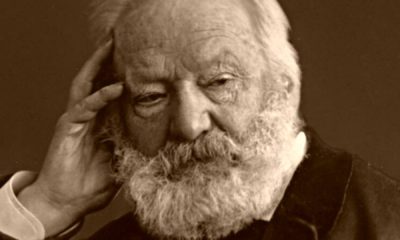Success Advice
10 Part Action Plan for Writing Your Very First Book
There’s no doubt that writing a book is an excellent way to bolster your credibility and establish yourself as an authority. A book can also help you spread ideas and is a mechanism for people to connect with you. It’s a self-contained product that you can monetize, but it can also be a vehicle to sell your products and services. In many ways, your book can be your ticket to new income streams and opportunities.
Use these 10 steps below to get going on your first book:
1. Ask Yourself How You Can Help
Your book requires an idea, but the masterpiece depends on the value you will provide to the reader. Start by asking yourself, “how can I help?” You may have experience in a particular field or a passion for a specific topic, but either way, you need to first answer this question.
In my situation, I knew I could help entrepreneurs finish things because I was already familiar with the demands of the lifestyle and regularly work in that environment. How can you help your readers?
2. Formulate Your Main Idea
Once you know how you can help your reader, the main idea should be easy. The main idea addresses how you will approach the subject. Will your book be a step-by-step guide or will it inspire your readers to higher levels? If you’re stuck figuring out your main idea, think of it in terms of a plan – you’re going to provide a specific plan to your readers to accomplish something. That becomes the main idea.
3. Remember the Three Act Play
In story writing, there’s a character arc, where the protagonist winds up in a setting, encounters tension, and then resolves that tension. You want to set up your book in the same way, even if it’s a nonfiction work. Begin by laying out the context for your reader. What problems are they facing? What obstacles are in their path? Then help them break through those problems and overcome those obstacles. Finally, don’t leave them hanging. Create a resolution that enables your readers to finish your book with a clear vision for moving beyond.
4. Title 15 Chapters
I’ve found that most failed author’s miss this strategy and it can make all the difference in finishing your first book. Open up a new document and give yourself numbers one through fifteen. After each number, give it a title that communicates the idea of that chapter. “1. Sleep’s Role in Weight Loss.” “2. How to Respond to a Micromanaging Boss.” You get the idea, but by giving each chapter a title, you’re essentially creating a roadmap for the completed book.
“By failing to prepare, you are preparing to fail.” – Benjamin Franklin
5. Write a One Sentence Summary of Each Chapter
As you come up with titles for each chapter, you will want to start creating one sentence summaries for each. Think of these as the miniature Christmas trees that will eventually have ornaments hanging on them when Christmas rolls around. The one sentence summary will also help you remember what you wanted to write about as you proceed through each chapter.
6. Divide and Conquer
Take 50,000 words and divide it by 15. Fifty-five thousand is the target number of words in your book. Fifteen is the number of chapters. Do that math and you’ll quickly see that you’ll only need about 3,300 words for each chapter. When we see a blank screen and the need for 50,000 words, most new authors tend to give up. Can you write 3,300 words? Yes, you can. It’s almost like writing a couple of magazine articles for each chapter.
Breaking up your book into smaller chunks will give you the psychological advantage of seeing light at the end of the tunnel. Conquer one chapter at a time, and before you know it, you will complete an entire book.
7. Spell Check
I can’t tell you how many times I’ve read a manuscript and it’s obvious the author never even bothered to spell check. If you don’t think your writing is worth the effort, why do you think your readers will take the time? It’s a fundamental rule of writing and will go a long way in proving to your readers you care about your craft.
8. Do a Table Read
Actors will often sit around a table reading a script prior to acting out a scene. Why? It ensures the dialogue is well-developed and makes logical sense. While you don’t necessarily need to read your book out loud, you do need to actually read it before you finalize it.
If you’re like most authors, your writing will take place over weeks or months, and involve many different emotional states. You don’t want your book to sound like it was written by a schizophrenic person, so read it through in one sitting at least once before you consider it complete.
“Read your paper backward, sentence by sentence, as a final proofreading step. This technique isolates each sentence and makes it easier to spot errors you may have overlooked in previous readings.” – Claire B. May Gordon S. May
9. Don’t Forget to Edit
The table read I described above is going to highlight problems with the flow and language in your book. That’s why you will want to follow immediately with a round of edits. Editing will also give you the opportunity to improve your material and eliminate the possibility of lingering mistakes in the manuscript.
10. Make a Plan to Distribute
If you plan to write a book but make no plan to get it out into the world, you will probably stop short of finishing. After all, why finish if no one will ever read it? At the very least, you should self-publish the book in digital format which is inexpensive and easy to accomplish.
The worst that could happen is that you’ve completed your first book! Best case scenario is that your book is picked up by a major publisher and sells millions of copies. Either way, you’re unlikely to finish what you start without a plan for distribution.
Now what? Start writing. There’s no way to finish your first book without some words on the page.
Have you ever wanted to write a book? If so, let us know in the comments below!
Explode Your Social Media
Want More Views? Master These 6 YouTube Growth Tactics
Getting a strong start or feeling stagnant are two completely different problems, but they both need momentum, viewer engagement, and growth to fix them.

Strategic planning combined with unwavering dedication allows you to rise above the chaos of YouTube—luck won’t get you anywhere. (more…)
Change Your Mindset
The Leadership Skill Nobody Talks About (But Changes Everything)
Curiosity often takes a back seat to certainty and gets labeled as a soft skill, which makes it sound obvious and easy

Most of us, when faced with challenges, instinctively seek certainty and answers. In turn, our ego steps in and prompts us to defend our views, double down, or perhaps disengage. (more…)
Success Advice
Breaking the Bias: How Females Can Thrive In The Workplace in 2025
The good news is that some steps can also be taken by female business leaders who are looking to voice and fight these issues, take charge of their careers, and grow their business or influence in the industry.

Over the past 100-odd years, women have played a critical role in the ever-changing labor force. (more…)
Success Advice
Success Isn’t Sexy: 5 Daily Habits That Actually Work
You’ll need to master the unsexy routines that build momentum in the background

There’s a gritty, unfiltered side of success that rarely makes it to our timelines or TED Talks. It’s not drenched in neon lights, wrapped in viral quotes, or toasted with champagne selfies. It’s quiet. It’s routine. And honestly? It’s often boring. (more…)
-

 Success Advice3 weeks ago
Success Advice3 weeks agoThe One Mindset Shift That Made Me Irreplaceable At Work
-

 Scale Your Business4 weeks ago
Scale Your Business4 weeks agoWhy Smart Entrepreneurs Never Skip This One Business Expense
-

 Success Advice3 weeks ago
Success Advice3 weeks agoHow Playing by the Rules Became the Smartest Business Strategy
-

 Did You Know2 weeks ago
Did You Know2 weeks ago7 Surprising Life Lessons Video Games Taught Me That School Never Did
-

 Success Advice2 weeks ago
Success Advice2 weeks agoHow to Build Trust, Kill Micromanagement, and Lead a Team That Thrives
-

 Scale Your Business2 weeks ago
Scale Your Business2 weeks agoHow to Build a Workplace People Actually Want to Show Up To
-

 Success Advice2 weeks ago
Success Advice2 weeks agoSuccess Isn’t Sexy: 5 Daily Habits That Actually Work
-

 Scale Your Business2 weeks ago
Scale Your Business2 weeks agoHow Smart Entrepreneurs Cut Financial Chaos in Half with One Simple Switch



























3 Comments